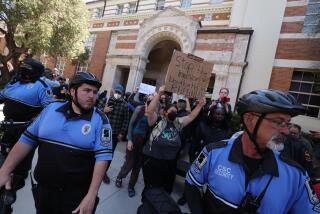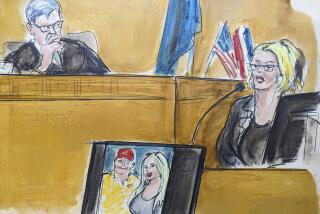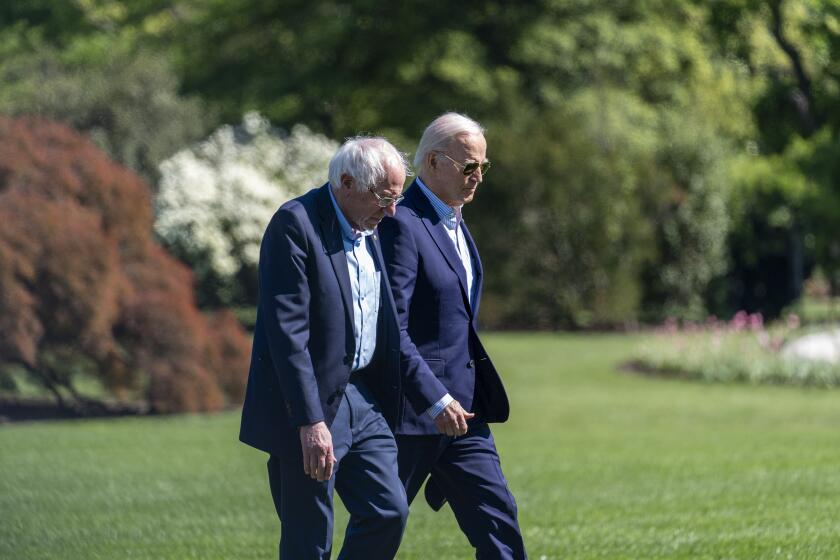Lungren Tries to Avoid Link to Big Tobacco
Even as Atty. Gen. Dan Lungren battles the tobacco industry in the biggest lawsuit of his career, the Republican candidate for governor is under attack for his views on--and ties to--Big Tobacco.
His Democratic rival, Lt. Gov. Gray Davis, and anti-tobacco forces say Lungren has been a friend of Big Tobacco who waited too long to join other states in a massive legal assault against the industry.
As Lungren absorbs the hits on the campaign trail, two of his top deputies participate in marathon settlement talks in Manhattan between three dozen states and the tobacco industry’s blue-chip law firms.
The attorney general knows that the stakes couldn’t be higher, for the people of California and for his political future. He has assigned 50 lawyers, researchers and clerks to the state’s suit alleging antitrust violations and fraud, and seeking reparations for smoking-related illnesses.
A sweet deal would provide a boost for Lungren. Lawyers say the state stands to get $23 billion, maybe more. If that happens, doubts about Lungren’s resolve on the issue might vanish. If it’s seen as a sweetheart deal, however, he would face yet more attacks.
“I’ll have to deal with the politics as they come,” he said in an interview.
Lungren, recognizing that voters take a dim view of politicians who seem to side with Big Tobacco, strives to keep the tobacco interests at arm’s length, saying he doesn’t even like to be around cigarettes.
His campaign hands out a paper titled, “The Truth About His Record on Tobacco.” It itemizes Lungren’s congressional votes against tobacco subsidies, in favor of a smoking ban on airlines and for higher tobacco taxes.
“I’ve got the most anti-tobacco record,” Lungren said.
Mixed Messages
However, a review shows Lungren’s record is mixed:
* As a gubernatorial candidate, Lungren has sworn off accepting donations from the industry. But he had received $49,000 since 1990, including $10,000 in 1996. Although the money is modest by California standards, Davis stopped taking tobacco money in the mid-1980s when he was in the Assembly and had collected $1,500.
* While in Congress, Lungren pushed the Product Liability Reform Act of 1986. The measure, which failed, sought to impose federal limits on suits in state courts. “A defective product,” it said, “may not be unreasonably dangerous if the defect is the subject of an adequate warning, is apparent to a reasonable person, or is a matter of common knowledge.”
Lungren said he was not thinking about tobacco when he signed on as a co-author. Rather, he said he was concerned that football helmet manufacturers were being sued.
Tobacco companies saw the bill as significant.
Officials at Lorillard Inc. kept a copy of Lungren’s legislation in their files, which later would be turned over to Minnesota in that state’s lawsuit against the industry. The year after the bill was introduced, Lungren addressed the Tobacco Institute, the primary industry trade group, at its annual convention, and received a $1,000 speaking fee.
* Lungren takes flak for hiring the Dolphin Group to manage his campaign. The Westwood political consulting firm has a long-standing relationship with Philip Morris, the nation’s largest cigarette company.
Dolphin in recent years helped Philip Morris mount opposition to California’s landmark ban on smoking in restaurants and bars, and ran the tobacco industry’s failed 1994 initiative campaign to repeal statewide smoking restrictions.
Lungren has a personal connection to Dolphin. His brother, Brian, works there and is helping run Lungren’s campaign.
Lungren said Dolphin’s work for tobacco never entered into his decision, and he could recall no conversations about tobacco policy with Dolphin consultants. “Maybe I’m closer to my brother than I am to any tobacco company. Come on. Give me a damned break,” he said.
* Since his days in Congress, Lungren has served as an unpaid member of the advisory board for the Washington Legal Foundation, a nonprofit group that has received significant tobacco industry donations and often has sided with tobacco interests in court and in congressional testimony.
As attorney general, Lungren signed a 1992 fund-raising letter for the group, heralding it as an antidote to “overzealous government bureaucrats, activist judges who legislate from the bench, litigious plaintiff’s attorneys and anti-growth ‘public interest’ legal groups.”
Attorney Edward L. Sweda of the Tobacco Products Liability Project, an anti-tobacco group at Northeastern University in Boston, said Lungren’s ties to the foundation may amount to a conflict.
“He’s going against Big Tobacco. But an organization with which he is affiliated has fought on the side of tobacco,” said Sweda. “He needs to take a definitive action to disassociate himself from it.”
Lungren spokesman Rob Stutzman labeled as “absurd” the charge that the candidate has a conflict. Lungren joined the group because “the attorney general agrees with many of the overall goals of the foundation, particularly its work on behalf of crime victims,” Stutzman said, adding that Lungren is “not personally familiar” with the foundation’s positions on tobacco.
The group, whose advisory board has included notable Republicans such as Gov. Pete Wilson and independent counsel Kenneth Starr, declines to disclose its donors. But documents released in the Minnesota litigation show its relationship with tobacco dates back a decade.
“These folks do good work, all of which is philosophically and otherwise oriented toward, and in support of, the industry’s positions in the legal, public policy and legislative areas,” said a 1989 letter from a Lorillard executive urging that Brown & Williamson Tobacco Co. also give to the group.
In 1993, a Philip Morris executive wrote glowingly of the group, saying the company “should seriously consider” upping its annual donation. Philip Morris had given the group $25,000 in 1991, records show.
The foundation’s lawyers have fought bans on tobacco billboards and criticized California’s aggressive anti-tobacco ad campaign, calling it a threat to the “principles of our system of democratic self-government.”
The group joined a court attack against a landmark 1993 study by the Environmental Protection Agency that declared secondhand tobacco smoke to be a cause of cancer. A federal judge in North Carolina recently declared that the study was based on “junk science.”
The EPA study was pivotal to California lawmakers who fought for this state’s indoor workplace smoking ban.
The foundation joined Lungren in a case before the California Supreme Court, arguing against a Bay Area lawyer’s right to sue supermarket chains that sold cigarettes to minors.
The California District Attorneys Assn. sided with the lawyer, Donald Driscoll. And the high court upheld the lawyer’s right to sue, ruling that private citizens can invoke state law for such violations.
Anti-Smoking Support
Lungren also has come down on the side of anti-smoking forces. His deputies have issued legal opinions supporting state laws restricting cigarette vending machines and banning smoking in restaurants and bars.
In 1994, Lungren deputies argued before the state Supreme Court that federal law did not preclude a private attorney from suing R.J. Reynolds Tobacco Co., charging that the company’s Joe Camel ads targeted children.
At Lungren’s urging, 27 other state attorneys general signed onto the brief. The court sided with Lungren, speeding the demise of the Joe Camel campaign.
“He stepped up at a time when we really needed him,” said San Diego lawyer Patrick Coughlin, who brought the Joe Camel case--and whose law partners are major Davis backers, giving his campaign $170,000 this year.
As attorney general, Lungren has had significant power to enforce and shape state laws, including those affecting tobacco interests. But that power pales compared to a governor’s.
The governor appoints state health officials, controls more than $450 million a year in tobacco tax money--a sum that could reach into the billions if Lungren’s suit succeeds--and decides how aggressive California’s anti-tobacco advertising campaign will be.
The governor also can veto or sign bills. Wilson signed the legislation that banned smoking in restaurants and bars. Next year, his successor is likely to be confronted by legislative efforts to roll back the smoking ban in bars.
Lungren says he would maintain an aggressive ad campaign but would sign legislation to weaken the ban on smoking in bars.
“There’s a point of being prudish about this,” Lungren said. “If someone wants to drink themselves to death, let ‘em smoke too.”
Late to the Party
Most attacks on Lungren over tobacco revolve around California’s lawsuit against the industry. By the time Lungren sued in June 1997, 36 other states already had filed, as had many counties, including Los Angeles and San Francisco.
Although Davis as lieutenant governor has no direct authority over tobacco control, he served as lead plaintiff in a lawsuit filed in January 1997 by private lawyers on behalf of California taxpayers.
Lungren said he believed that Congress should have settled the states’ complaints against the tobacco industry. Beyond that, he said he felt constrained by 1987 legislation that overhauled California civil law.
Under the law, consumers could not hold manufacturers liable if the product that caused their injury “is inherently unsafe and is known to be unsafe by the ordinary consumer.” It cited tobacco as one of the products.
“We had a specific statute and I wasn’t quiet about that,” said Lungren. “I told the Legislature for months, ‘If you want me to [sue], change the law.’ ”
But Davis and state Sen. Bill Lockyer (D-Hayward)--one of the law’s architects and currently a candidate for attorney general--maintain that although the law blocked some individual smokers from suing, it did not bar the state from suing to recoup the cost of caring for people with tobacco-related disease.
And although Texas had a similar law granting immunity to the tobacco industry, Texas’ attorney general filed that state’s tobacco suit in federal court in 1996 and settled this year for $17.3 billion, to be paid over 25 years.
The California Legislature approved legislation in June 1997 that removed the immunity for tobacco. Lawmakers said they were merely clarifying the state’s authority to press its claim against the tobacco industry.
On the day the bill became law, Lungren sued in Sacramento County Superior Court, accusing the industry of a variety of wrongs and making the claim he said he couldn’t bring without the legislation--that the tobacco industry should pay the state’s costs of caring for indigents with tobacco-related illness.
The battle shifted to the Sacramento courtroom of Judge John Lewis. Siding with tobacco lawyers, Lewis concluded that the Legislature’s action last year did not solve the problem. The judge cited Lungren’s comments about the “sweeping” immunity granted to tobacco in 1987 and threw out a significant part of the case--the request for reimbursement of health care costs. Lungren’s deputies have appealed the ruling.
The tobacco case is never far from Lungren’s mind. Between campaign stops, he keeps in contact with attorneys trying to settle the suit.
If a deal comes before the Nov. 3 election and is large enough, Lungren could, in an instant, quash talk that he is soft on tobacco. But he also assumes that Davis, whose suit was combined with the state’s, might try to share the glory.
“If Gray Davis can take credit for three strikes and the death penalty,” said Lungren, “I suppose he could take credit for a tobacco settlement he had nothing to do with.”
More to Read
Get the L.A. Times Politics newsletter
Deeply reported insights into legislation, politics and policy from Sacramento, Washington and beyond. In your inbox three times per week.
You may occasionally receive promotional content from the Los Angeles Times.






